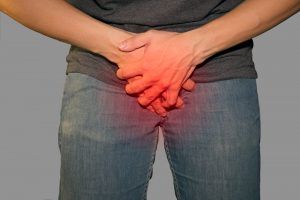The most common signs of erectile dysfunction are not being able to get an erection and not being able to hold an erection for as long as desired. (Learn more)
There are other, less common signs of erectile dysfunction that are mostly sexual in nature, including premature and delayed ejaculation, as well as reduced libido. (Learn More)
Erectile dysfunction is common, affecting millions of men in the U.S. It can be experienced by men at any age, but it becomes more likely as you get older. (Learn More) Erectile dysfunction can be caused by many different issues, and it can range from mild to complete. Because ED symptoms can indicate serious health problems, they should be discussed with your doctor. (Learn More)
There has been research showing a strong connection between ED and cardiovascular disease. Anyone with ED should talk to their doctor about symptoms and get screened for heart conditions. Other health problems, including diabetes, high blood pressure, and obesity, have also been shown to cause ED. (Learn More)
Many prescription medications can lead to erectile dysfunction, but don’t stop taking your medication or change your dose without first talking to your doctor. The list of medications that can cause ED is long, but it includes some types of heart and blood pressure medicines, antidepressants, opioids, and hormone drugs. (Learn More)
Most erectile dysfunction problems are caused by an underlying physical health issue, but some psychological problems can trigger ED or at least contribute to it. These psychological issues include guilt, depression, anxiety, and shame. (Learn More)
Understanding Erectile Dysfunction

Erectile dysfunction (ED), sometimes also called impotence, is a condition in which a man regularly experiences difficulty obtaining an erection or keeping an erection firm enough to have sex.
While occasional problems with erections are common, especially due to stress and/or relationship problems, frequently or repeatedly experiencing the inability to get or stay hard — to the point where it’s interfering with your sex life — means you’re likely struggling with erectile dysfunction.
ED can range in severity, including mild, moderate, severe, and complete erectile dysfunction.
Erectile dysfunction can be caused by a number of factors, both physical and emotional. This means that not only can erectile dysfunction cause serious problems in your relationships and with your self-esteem, it may also be a symptom of an underlying medical or emotional problem.
This is why it’s so important to speak to a medical professional to diagnose and treat any erectile dysfunction problems you may be having. Doing so can help you to address any root issues early on and avoid further stress or damage to your relationships.
How Common Is Erectile Dysfunction?
While it may seem difficult to bring up the topic of erectile dysfunction with your doctor, there’s no need for discomfort. ED affects millions of men in the U.S., and it can occur at any age.
According to the National Institute of Diabetes and Digestive and Kidney Diseases (NIDDK), approximately 30 million men in the U.S. are affected by erectile dysfunction.
While ED is experienced by younger men, it is more common among older men, and the risk of developing ED increases with age. While complete ED is experienced by only around 5 percent of 40-year-old men, about 15 percent of men experience complete ED by age 70.
Mild and moderate erectile dysfunction affects nearly 10 percent of men per decade of life. For example, 50 percent of men in their 50s experience some level of ED.
Most Common Signs

The most common symptoms of erectile dysfunction (ED) relate to sexual difficulties. They include:
- Not being able to get an erection when you want to have sex. This can be sometimes, in cases of mild or moderate ED, or all the time, in cases of severe or complete ED.
- Not being able to sustain an erection long enough to have sex.
- Not being able to sustain an erection long enough for sexual fulfillment.
Less Common Signs
While the most common and telling signs of an erectile dysfunction problem relate to the inability to obtain or hold an erection, other symptoms are may also be related to ED or indicate a risk of developing ED. These include:
- Premature or delayed ejaculation.
- Being unable to ejaculate.
- Pelvic trauma, including a fractured pelvis.
- Unusually low levels of testosterone (a hormone).
- Lower sex drive or impacted libido.
- Not becoming aroused after stimulation that would usually arouse you.
What Health Problems Cause ED?
Recurring erection problems or ED symptoms should always be addressed with a doctor because they may indicate a more serious problem.
For example, research indicates a strong link between ED and cardiovascular disease. Anyone struggling with ED should be screened for cardiovascular problems or heart irregularities, especially those with a family history of these problems. In a 2007 John Hopkins University study, 90 percent of men with ED exhibited at least one risk factor for cardiovascular disease.
The following are other physical causes of ED:
- High blood pressure
- Diabetes
- Obesity
- High cholesterol
- Multiple sclerosis (MS)
- Parkinson’s disease
- Thyroid conditions
- Testosterone deficiency
- Other hormonal disorders
- Alcoholism and substance abuse
- Smoking
- Disorders of the penis (Peyronie’s disease)
- Prostate disease
- Radiation treatment that affects the pelvic area
- Blood flow and artery problems, including atherosclerosis
What Medications Cause Erectile Dysfunction?
Prescription medications are a common cause of ED and may be a reason why older men are more commonly affected by it. If you’re on one of these medications, do not stop taking it without first consulting the prescribing doctor.
Medications that can cause ED include some types of the following:
- Blood pressure and heart medications
- Diuretics
- Opioids (painkillers)
- Sleeping pills
- Antidepressants
- Hormone drugs
- Cancer drugs, including some chemotherapeutics
- Ulcer medications
- Anxiety medications
- Prostate medications
- Anticholinergics
Can Emotional Problems Cause ED?
Physical causes are at the root of most erectile dysfunction problems, but psychological issues can also play a role in ED. The following psychological issues can contribute:
- Fear of intimacy
- Guilt or shame
- Depression
- Anxiety
While psychological problems alone aren’t usually the cause of ED, there is often a layering of mental and psychological issues. For example, a man’s obesity may cause him to have ED due to limited circulation and blood flow, but it may also cause him to have depression or low self-esteem, which can also contribute to ED.
References
Everything You Need to Know About Erectile Dysfunction (ED). (May 17, 2017). Healthline.
18 Million Men in the United States Affected by Erectile Dysfunction. (February 1, 2007). John Hopkins University.
Erectile Dysfunction (ED). University of Wisconsin Hospitals and Clinics Authority.
Definition & Facts for Erectile Dysfunction. (July 2017). National Institute of Diabetes and Digestive and Kidney Diseases (NIDDK)
Symptoms of Erectile Dysfunction. (May 10, 2019). Verywell Health.
Current Diagnosis and Management of Erectile Dysfunction. (April 13, 2015). Current Sexual Health Reports.
Is Erectile Dysfunction Psychological? (September 15, 2016). Healthline.










